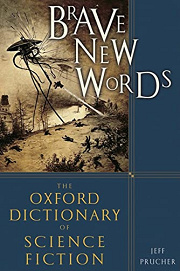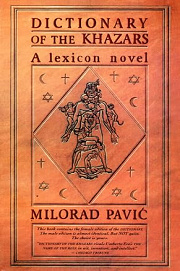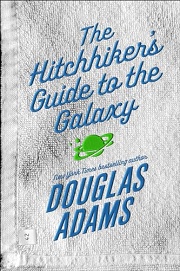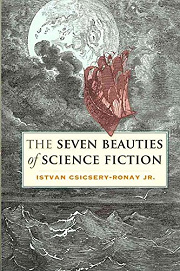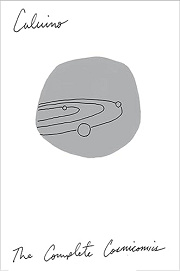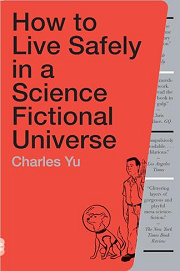Share your thoughts in a quick Shelf Talk!
Brave New Words: The Oxford Dictionary of Science Fiction by Jeff Prucher
From “warp drive” to “grok,” the language of the future has a past. Brave New Words: The Oxford Dictionary of Science Fiction is a delightful tour through the slang, neologisms, and cultural touchstones that built the lexicon of SF—perfect for fans who love words as much as worlds.
Have you read this book? Share what you liked (or didn’t), and we’ll use your answers to recommend your next favorite read!
Love Brave New Words: The Oxford Dictionary of Science Fiction but not sure what to read next?
These picks are popular with readers who enjoyed this book. Complete a quick Shelf Talk to get recommendations made just for you! Warning: possible spoilers for Brave New Words: The Oxford Dictionary of Science Fiction below.
In Brave New Words: The Oxford Dictionary of Science Fiction, did you enjoy ...
... the entry-by-entry, faux-reference structure that turns definitions and citations into a story?
Dictionary of the Khazars by Milorad Pavić
If you loved how Brave New Words let you wander from “ansible” to “cyberspace” to “grok” via layered citations, you’ll savor the way Dictionary of the Khazars becomes a narrative through its cross-referenced entries. Like tracing Brave New Words’ trail from Le Guin’s instantaneous communicator to Gibson’s net to Heinlein’s Martian verb, Pavić’s lexicon invites you to hop between red, green, and yellow “sources,” assembling meaning from scholarly fragments, marginalia, and contradictions. It’s the joy of research-as-adventure, where the form itself is the plot.
... playful, tongue-in-cheek riffing on SF jargon and tropes you tracked through terms like “space opera,” “retcon,” and “terraforming”?
The Hitchhiker's Guide to the Galaxy by Douglas Adams
The mock-reference voice that makes Brave New Words so fun—glossing how “space opera” evolved, or how “terraforming” shifted from Williamson’s coinage to mainstream usage—finds its comic counterpart in the in-universe Guide entries that punctuate The Hitchhiker’s Guide to the Galaxy. Adams turns the lexicon into punchlines: the Babel fish as a living translator, “Don’t Panic” as a meta-slogan, and absurd redefinitions of cosmic commonplaces. If the wry taxonomies and usage notes in Prucher’s book made you grin, this will make you laugh out loud.
... the intellectual archaeology behind terms like “cyberspace,” “robot,” and “first contact,” and what they reveal about the genre?
The Seven Beauties of Science Fiction by Istvan Csicsery-Ronay Jr.
Reading the etymologies and citation chains in Brave New Words—from Čapek’s “robot” to Gibson’s “cyberspace,” from Campbell-era “first contact” scenarios to modern riffs—primes you for this deep-dive into how SF’s core effects work. Csicsery-Ronay unpacks the poetics behind ideas you traced in the dictionary, showing why neologisms stick, how cognitive estrangement functions, and what cultural work these concepts perform. It’s the same thrill of following a term’s lineage, now expanded into a rich critical framework.
... bite-size entries that each open a window onto a different SF concept—like hopping from “ansible” to “terraform” to “nanotech”?
Cosmicomics by Italo Calvino
If you enjoyed dipping into Brave New Words one entry at a time—finding a new spark in each definition and citation—Cosmicomics offers that same modular delight in story form. Each tale starts from a scientific premise (the birth of the moon, the expansion of the universe) and spins a dazzling vignette around it, much the way a dictionary entry blooms from a headword into a web of influences and examples. It’s the pleasures of selective browsing, but narrativized and wondrous.
... self-aware commentary on how SF terms and tropes shape our sense of reality, like tracing “retcon” or “time travel” through citations?
How To Live Safely In A Science Fictional Universe by Charles Yu
Following how Brave New Words documents the evolving usage of “time travel” or the slippery practice of the “retcon” sets you up perfectly for Charles Yu’s meta-adventure. As a time-machine repairman who literally steps into his own manual, Yu treats tropes like entries that define his life, annotating his reality with footnotes and callbacks. It’s the same self-reflexive pleasure you get from Prucher’s curated quotations—only now the lexicon talks back.
Unlock your personalized book recommendations! Just take a quick Shelf Talk for Brave New Words: The Oxford Dictionary of Science Fiction by Jeff Prucher. It’s only a few questions and takes less than a minute.
